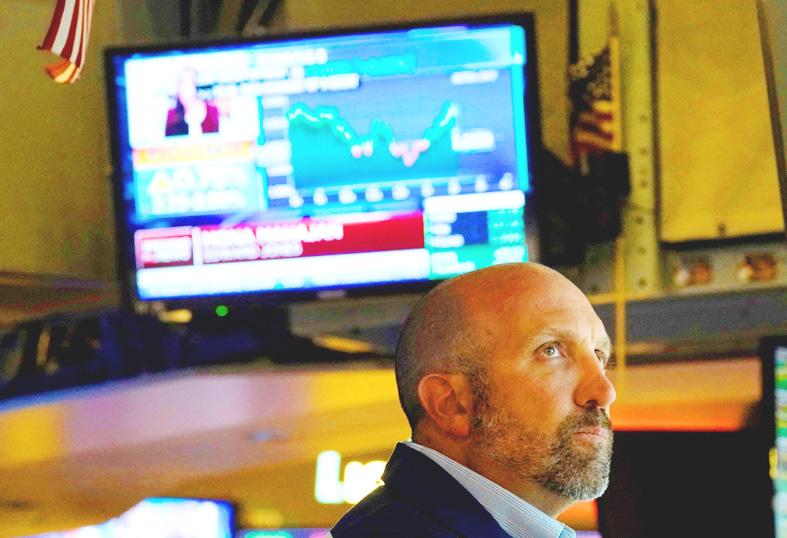Shares yesterday slipped in Europe after gains in most Asian markets following a surge on Wall Street fueled by hopes that the US Federal Reserve might slow its pace of inflation-fighting interest rate hikes.
The Fed raised its main interest rate by 75 basis points as expected, and reiterated inflation control as its priority.
However, it dropped guidance on the size of its next rate hike, and said that “at some point” it would be appropriate to slow down.

Photo: AFP
Analysts cautioned that the initial joy, which sent New York’s three main indices soaring, could be short-lived as the global economy continues to face several headwinds, and inflation would likely not come down quickly.
The TAIEX closed down 29.69 points, or 0.2 percent, at 14,891.90, but Shanghai, Tokyo, Sydney, Seoul, Singapore, Mumbai, Manila, Jakarta and Wellington were in positive territory.
Hong Kong slipped 0.2 percent to 20,622.68, as its de facto central bank followed the Fed in lifting rates owing to its currency peg.
European shares came off session highs after a slew of downbeat corporate earnings.
There is growing concern that the sharp rise in rates is bearing down on the world’s top economy and could send it into a recession.
US Federal Reserve Chairman Jerome Powell said he did not consider that to be the case, as “there are too many areas of the economy that are performing too well,” adding, however, that growth was slowing.
Central bank officials would not provide any guidance on their next move, instead taking each decision on a meeting-to-meeting basis, Powell said.
While another “unusually large increase could be appropriate” in September and officials “wouldn’t hesitate” to lift by 1 percentage point, markets took heart from the suggestion that the bank was ready to take its foot off the gas toward the end of the year, he said.
The prospect of a slower pace of rate hikes weighed on the US dollar against most other currencies, and yesterday it hit its lowest level against the yen since July 6.
However, there was a warning that the positive mood might not last.
“This market move is the victory of hope over experience,” BlackRock Inc strategist Jeffrey Rosenberg said. “I’d be a little bit cautious.”
Citigroup Inc analysts Andrew Hollenhorst and Veronica Clark said in a statement that traders appeared to be misjudging Powell’s remarks.
“We read Chair Powell’s press conference as more hawkish than the market’s interpretation,” they said, adding that inflation readings excluding food and energy will “push the Fed to hike more aggressively than they or markets anticipate.”
Second-quarter growth data in the US were to be released yesterday. After a 1.6 percent contraction in the previous three months, another negative reading could put the economy into a technical recession.
Yesterday’s phone call between US President Joe Biden and Chinese President Xi Jinping (習近平) was also high on the agenda of what investors were watching, as the world’s superpowers tried to navigate a period of rising tensions. A trade dispute between the US and China was one of the main areas of focus.
Additional reporting by AP and Reuters

Vincent Wei led fellow Singaporean farmers around an empty Malaysian plot, laying out plans for a greenhouse and rows of leafy vegetables. What he pitched was not just space for crops, but a lifeline for growers struggling to make ends meet in a city-state with high prices and little vacant land. The future agriculture hub is part of a joint special economic zone launched last year by the two neighbors, expected to cost US$123 million and produce 10,000 tonnes of fresh produce annually. It is attracting Singaporean farmers with promises of cheaper land, labor and energy just over the border.

US actor Matthew McConaughey has filed recordings of his image and voice with US patent authorities to protect them from unauthorized usage by artificial intelligence (AI) platforms, a representative said earlier this week. Several video clips and audio recordings were registered by the commercial arm of the Just Keep Livin’ Foundation, a non-profit created by the Oscar-winning actor and his wife, Camila, according to the US Patent and Trademark Office database. Many artists are increasingly concerned about the uncontrolled use of their image via generative AI since the rollout of ChatGPT and other AI-powered tools. Several US states have adopted

KEEPING UP: The acquisition of a cleanroom in Taiwan would enable Micron to increase production in a market where demand continues to outpace supply, a Micron official said Micron Technology Inc has signed a letter of intent to buy a fabrication site in Taiwan from Powerchip Semiconductor Manufacturing Corp (力積電) for US$1.8 billion to expand its production of memory chips. Micron would take control of the P5 site in Miaoli County’s Tongluo Township (銅鑼) and plans to ramp up DRAM production in phases after the transaction closes in the second quarter, the company said in a statement on Saturday. The acquisition includes an existing 12 inch fab cleanroom of 27,871m2 and would further position Micron to address growing global demand for memory solutions, the company said. Micron expects the transaction to

A proposed billionaires’ tax in California has ignited a political uproar in Silicon Valley, with tech titans threatening to leave the state while California Governor Gavin Newsom of the Democratic Party maneuvers to defeat a levy that he fears would lead to an exodus of wealth. A technology mecca, California has more billionaires than any other US state — a few hundred, by some estimates. About half its personal income tax revenue, a financial backbone in the nearly US$350 billion budget, comes from the top 1 percent of earners. A large healthcare union is attempting to place a proposal before